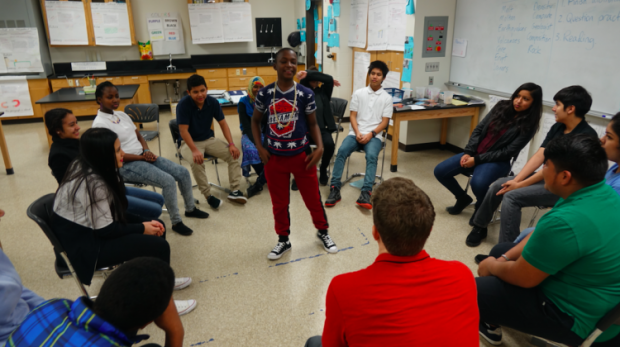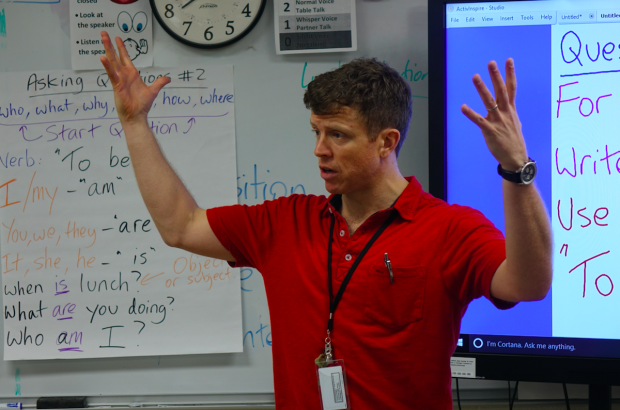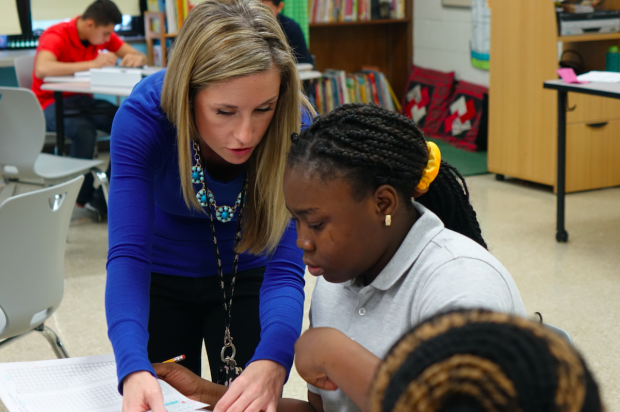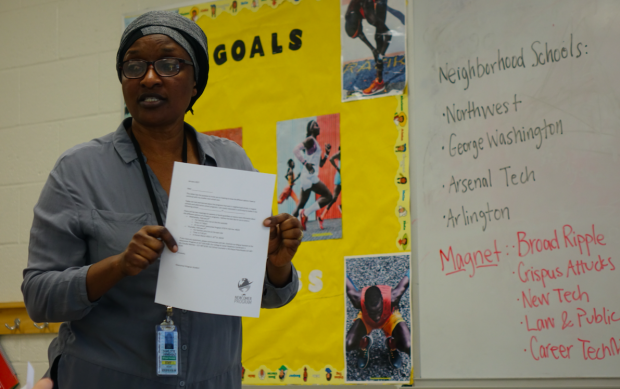Indy School For Immigrants, Refugees Grows Bigger By The Day

Students in Andy Slater’s science class start the morning by playing a word game. Students jump up to move to an open seat if they agree with what the standing student says – sort of like musical chairs. (Eric Weddle/WFYI)
It’s just after 7:30 a.m in Andy Slater’s ninth grade science class. Students sit on chairs in a circle — they play a few quick word games and ask each other basic questions.
But there’s one catch.
“Come on, in English,” Slater says. “In Inglés.”
Slowly the chatter in Spanish, Swahili and other languages dies down. A student standing in the middle of the circle slowly says: “Big wind blows … if you like school.”
It’s a game. Students jump up and move to an open seat if they agree with what the standing student says – sort of like musical chairs.
This is how every day begins at the Newcomer Program – a Far Westside Indianapolis school for refugees and new immigrants, those here legally or illegally — about 10 minutes to build relationships and English skills with different word games.
Like any school, students here try to find themselves and fit in. But unlike other Indiana schools, all of these seventh through ninth graders are adjusting to a sudden immersion in American culture.
Some students enroll with little formal education, unfamiliar with computers or even know how to hold a pencil. Others don’t understand hallways lockers.
There are other adjustments, like the cafeteria. Stomachaches can be common when new students eat sausage for the first time.
And students can bring scars of trauma from experiences in their home country or anxiety about their future here.
Students come from all over the world. Most speak Spanish but a dozen other languages are heard in the hallways.
“It’s nice,” a ninth grader who goes by Gareth says.
Gareth’s full name is Mehm Yar Zar Mon Sai. So far, he’s the only student at the school who speaks Burmese. After relocating to Indianapolis in 2016 with his mother, he started out at Northwest High School, but struggled. The Newcomer Program has boosted his confidence.
“Circle time is fun, helpful,” he says quietly, referring to the first 10 minutes of class. “I learn about other people’s culture.”

Science teacher Andy Slater talk to his ninth grade class about the earth’s core during a January morning at the Newcomer Program. (Eric Weddle/WFYI News)
Crossing the cultural divide can be a challenge, says Slater, who only speaks English. He has no prior experience teaching immigrant students. The fall semester was rough, he says, but he’s found his groove.
In the class, Slater uses drawings, acting, and an electronic translation program to teach students about science: volcanic eruptions, why ice melts and what the difference is between mass and density.
“I had to shift from thinking that about it as a science class that was trying to teach English. It’s an English class that uses a little bit of science,” he says. “And once I made that paradigm shift, it made a big difference.”
‘Word Of Mouth’
Indianapolis Public Schools started the Newcomer Program in August as a way to offer extra support for students newly arrived in the country and those who score low on an English linguistic test.
The district had struggled to collect academic data on students new to the country and provide services for students scattered throughout the city at different buildings. Graduation rates were “deplorable,” says Jessica Feeser, district ESL coordinator.
“Prior to this, our newcomers would be some of the students who come to school for a day or two, maybe a week or month, maybe even six months even but then we wouldn’t see them again,” Feeser says. “So this has really, really, really been transformational in ensuring that students are getting that content, the English language acquisition support that they need to be successful.”
Teaching English at the secondary level is much more challenging for students and educators, Feeser says, than in elementary ages. Providing students with a year of support from teachers and aides is a game changer for the district, she says.
“Some really have had huge gaps in their education. But it’s great because it’s like one big family,” Feeser says. “The kids are really accepting of one another. Everybody understands that they are in the same boat.”
Spanish makes up for 94 percent of the second language spoken by IPS students, according to 2015 data. The rest is split among 56 languages with Arabic and Karen, a language spoken by some in Burma, as the two most prominent.
The goal of the Newcomer Program is to prepare the students with enough skills and English language know-how after one year for them to comfortably transfer to another city school.
IPS covers most of the program’s budget costs – $1.1 million – from its general fund. Little state and even fewer federal dollars support it. That’s unlikely to change under new state and federal budgets.
When the Newcomer Program opened last August, an estimated 60 to 80 students were expected to choose it. But families kept showing up to enroll their kids at the 38th and Moller Road school. Some walked in holding printouts of media reports about the program.
On April 5th, enrollment was at 209 students. The next day, it climbed to 212. This summer, it will expand for students in grades three through six for the 2017-18 school year.
“Like everyone says, it’s a good problem to have because this is clearly word of mouth and students are feeling really safe here and families know that we are here to support,” says Amanda Clayton, school director. “That is why we just keep getting more and more.”

English teacher Kelly Minks works with students on pronunciation of English words during a January class at the Newcomer Program. (Eric Weddle/WFYI News)
Making students and families feel comfortable and safe is a top priority for Clayton. Part of that is having a room for prayer and community meetings. The school uses art therapy to help students talk about their past trauma.
A partnership with Butler University also provides English as second language classes to students’ families.
Political Anxiety
After the election of President Donald Trump the school attracted venomous online comments, following media coverage at the school. Trump’s immigration stance has also brought fear to some students.
“We have seen tears. We have seen breakdowns,” Clayton says. “We’ve had students say, ‘Am I going to be sent back? And If I am, I’m scared I’m going to be killed.”
As a response, the school has hosted meetings with immigration lawyers to answer questions for families and school staff. In February the IPS School Board pledged to protect undocumented and immigrant students from facing deportation and discrimination.
‘Now We Feel Comfortable’
As uncertainty and divisiveness over immigration politics continue, it’s not just students shouldering the worries.
Staff member Charlotte Uwimbabazi feels it daily.
Originally from the Congo, Uwimbabazi was living in South Africa for eight years, before relocating to Indianapolis in March 2016 through a United Nations program.
When she arrived, one of her four children attended another IPS school. But administrators thought he should attend the Newcomer Program instead. Uwimbabazi disagreed. When she went to argue her son’s case, she wound up getting a full-time job in the program as a translator and helping the classrooms.
“In America, I can say, is the land of opportunity,” she says during an interview in mid-January. “We didn’t have a human right where we was. But in America, there is a human right. You can get a job. You can study. I like it.”

Charlotte Uwimbabazi translates to students during a session about the different high school options available to students in the 2017-18 school year. (Eric Weddle/WFYI News)
Instantly, Uwimbabazi became a beacon for the African students at the school.
“Many of them, they wanted to speak Lingala or Swahili and they come to me and say, ‘Lady we are very happy,” she says. “Before we see you here, we feel we lost. But now we feel comfortable because we are with you.”
In mid-January, she was hopeful that her husband in South Africa would join the family in Indianapolis as a refugee.
Then came Trump’s executive order to suspend refugees from seven countries. Even though South Africa was not on the list, it’s led to much much uncertainty. Uwimbabazi recently canceled a trip to visit her husband, out of concern she may not be able to return.
But she remains hopeful. In South Africa, she cleaned homes. When Uwimbabazi started work at the Newcomer Program, she struggled to use a computer and asserting herself.
Today, she sends texts and says she wants to become a teacher.
“I promise you I will do all my best,” Uwimbabazi says to Clayton, the school leader, one afternoon in March. “Because they show me the love. That is why I got the courage to do everything here.”
Those uneasy feelings are common at the school, says Clayton. And someone like Uwimbabazi can relate.
“She is one of the ones who can say, I understand,” Clayton says. “So having staff members who can share some of the same stories, is not only important but, in my opinion, necessary. We have to have that for our students.”
The Newcomer Program continues to enroll students for this year and 2017-18 school year when it will expand to third through ninth grades.
Contact WFYI education reporter Eric Weddle at eweddle@wfyi.org or call (317) 614-0470. Follow on Twitter: @ericweddle.